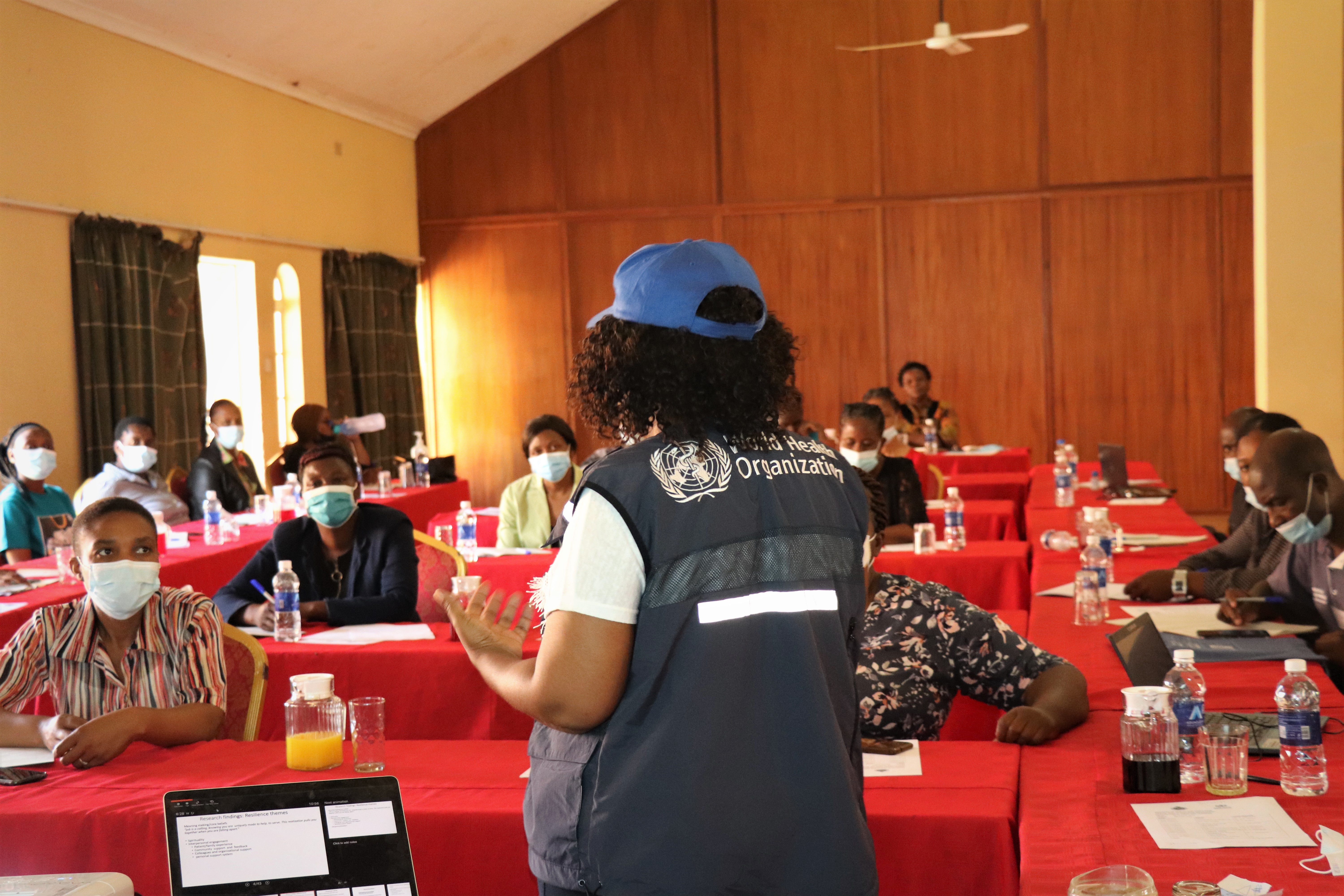Bulawayo and Harare health care workers gain new skills on management of stress, anxiety and depression during the COVID-19 pandemic

By Tatenda Chimbwanda
Mazowe, Zimbabwe – "l really needed this training, as nurses we have just gone through a lot of emotional trauma during this COVID-19 pandemic, including experiencing stigma from our colleagues as well as the community,” says Blessing Munjere, Sister in Charge at Sally Mugabe Central Hospital.
In response to the plight of stressed health care workers on the front line of COVID-19 like Blessing, the Ministry of Health and Child Care (MoHCC), Mental Health (MH) Services Department with support from WHO has trained 84 health workers on MH and Psycho-social Support (MHPSS). The trainings focused on building capacity of health workers to provide patients with psycho-social support, deal with the issues of stress, discrimination and fear in dealing with COVID-19. The training also strengthened health worker’s ability to deal with issues of bereavement and coping with deaths of coworkers and relatives as well as identify signs of psycho-social/ mental problems among their colleagues.
Dr Sacrifice Chirisa, MoHCC, Mental Health Deputy Director said “the training was part of MoHCC efforts to decentralize MH services, by moving away from institution-based care, through strengthening care at primary health and community levels.”
“When l was diagnosed with COVID-19 in July, l went through a lot of physiological distress and it made me realize a lot of my colleagues were in the same predicament as me. And so, we had to come up with this training and ensure health care workers receive the emotional support they need to continue providing quality care for their patients,” he explained.
The workshop started with health care workers in Harare and Bulawayo because they have the highest number of COVID-19 infections in Zimbabwe. The training was conducted in a phased approach, with 26 health workers from Harare trained between 15-16 October in Mazowe. This was followed by 35 health workers trained in Bulawayo (21-22 October) and lastly 23 health care workers from Harare trained between 27-28 October in Mazowe.
Whilst the pandemic is affecting the communities, it has not spared health workers across Zimbabwe who have been on the front line of caring for COVID-19 patients and delivering essential health services during the pandemic. As a result, health workers have been feeling the pressure and stress associated with the fear of being infected and infecting their loved ones at home.
For instance, 58 nurses resigned from their posts in the first 3 months of the pandemic as a result of fear, anxiety and physiological distress in Mashonaland Central. The workshop came at the right time as it focused on also taking care of health workers, who are often neglected especially during times of emergencies despite them facing stigma and discrimination in the communities they live in.
Moreover, Zimbabwe has significant MH needs yet it has less than 7 MH workers supporting more than 100 000 people. Although Zimbabwe developed a national MH policy, the availability of services is often limited to specialized institutions in capital cities such as Harare and Bulawayo.
“Soon after the training the healthcare workers are expected to cascade their training down to the community level. This will enable more Zimbabweans to have access to MH services at community level as more health care workers now have the basic skills to provide MHPSS,” noted Dr Edmore Munongo, WHO Non-Communicable Diseases and Mental Health Technical officer.
In addition, the workshop adopted WHO, MH-Gap approach, a task sharing strategy where primary health care workers are trained and then supervised in managing common mental disorders. The latter, was done under WHO’s Universal Health Coverage and Emergencies Programs whose main objective is to achieve sustainable development goal 3, target 3.4 (reduce by one third premature mortality from non-communicable diseases through prevention and treatment and promote mental health and well-being by 2030).
In the context of COVID-19, WHO and other partners continue to support MoHCC include mental health care as part of continuity of essential health services and integrate MHPSS into primary care by providing psycho-social skills training for first respondents.
Communications Officer
Tel: + 263 914 31408
Email: juliasw [at] who.int


